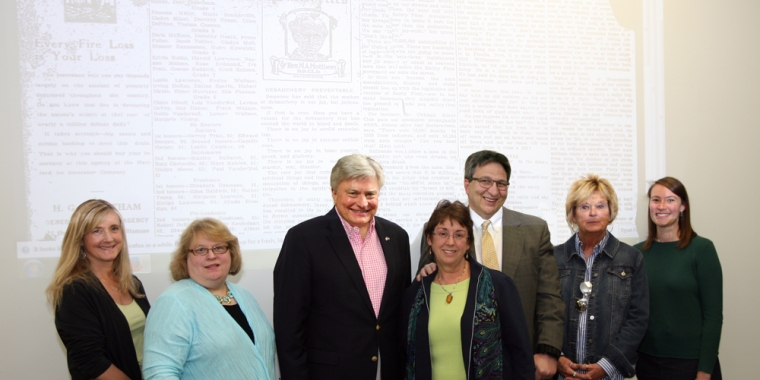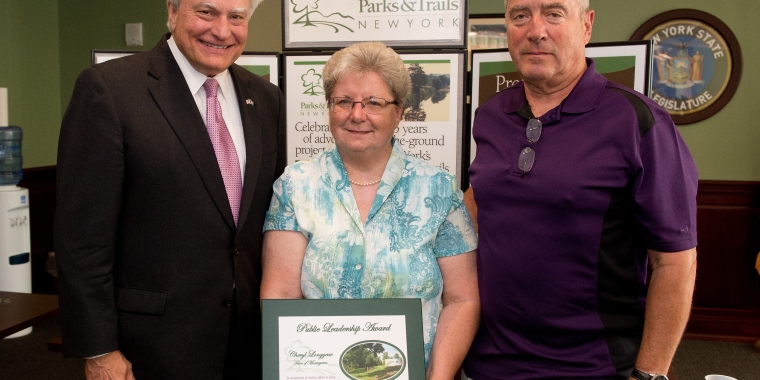
Nozzolio Opposes Governor Paterson's Tax and Fee Increases
Please click here to voice your opposition to Governor Paterson's proposal to implement 137 new taxes and fees on New York's already overburdened taxpayers.
Below is a list of Governor Paterson's tax proposals.
- Restructure the Clothing Exemption. Eliminates the sales tax exemption for clothing and footwear priced under $110 and replaces it with two, one-week exemption periods for clothing and footwear priced under $500. Localities will have an option to join the state in offering this exemption.
- Extend New York City Personal and Credit Services Sales Tax Statewide. Makes personal services (such as beauty, barbering, manicure, pedicure, massage, health salon, or gymnasium services) and credit rating and reporting services subject to sales tax statewide. Currently, only New York City sales tax applies to these services.
- Extend Sales Tax to Entertainment-Related Spending. Imposes a sales tax on entertainment-related consumer spending, including but not limited to, movie theaters and sporting events. Most states tax entertainment-related services (31 states tax concerts, theaters, and movies; 27 states tax participatory sports; 22 states tax health clubs; 36 states tax amusement parks and rides; 34 states tax circus admissions).
- Extend Sales Tax to Transportation-Related Spending. Imposes a sales tax on transportation-related consumer spending, including but not limited to, taxis, limousines and buses. Several other states tax transportation-related services (8 states tax taxis; 16 states tax limousine services; 9 states tax chartered flights).
- Limit Itemized Deduction for High Income Taxpayers. Limits the ability of taxpayers with incomes over $1 million to reduce their tax liability by claiming itemized deductions. Currently, taxpayers with incomes over $525,000 are allowed to claim 50 percent of the value of itemized deductions. Charitable deductions would be excluded from this proposal and may still be claimed as itemized deductions for the purposes of state income taxes. Additionally, all of these deductions could still be claimed on federal taxes.
- Limit the Capital Improvement Exemption. Limits the capital improvement exemption under the tax code to new construction, a new addition to existing construction, or complete reconstruction. Currently, a capital improvement is defined as an addition or alteration to real property that (1) substantially adds to the value of the real property or appreciably prolongs its useful life, (2) becomes part of the real property or is permanently affixed so that removal would cause material damage to the real property or to the article itself, and (3) is intended to become a permanent installation. This provision would apply the sales tax consistently with other purchases that would improve, or be used within, a property but would not be considered to be part of the real property.
- Repeal the Sales Tax Cap on Fuel. Repeals the current state sales tax cap of eight cents per gallon on motor fuel and diesel motor fuel. There is no demonstrated evidence that this cap provides savings that are passed on to consumers.
- Extend Sales Tax to Cable and Satellite Television and Radio. Imposes sales tax on television and radio services provided by cable, satellite or other similar means. This is the practice of 23 other states.
- Repeal Bad Debt Provisions. Closes the current loophole that allows certain vendors such as private label credit card lenders (e.g. department stores) to reclaim sales tax revenues from debts that are not repaid, but prohibits other vendors or lenders to access these revenues. This proposal would limit the credit refund to the vendor only.
- Reform the Cigar Tax. Modifies the taxation of cigars to impose a tax of $0.50 per cigar to simplify the administration of the tax. The current tax is equal to 37 percent of the wholesale price or approximately $0.34 per cigar.
- Standardize Tax on Flavored Malt Beverages. Increases the tax on flavored malt beverages to levels consistent with the taxes imposed on other alcoholic beverages.
- Eliminate Underutilized Tax Credits. Eliminates six credits currently allowed under corporate franchise taxes and the personal income tax. All of these credits are underused, as indicated by the number of claimants and by the small total dollars claimed. The credits that would be eliminated are the automated external defibrillator credit, the fuel cell electric generating credit, the security guards training credit, the alternative fuels credit, the qualified emerging technology company (QETC) capital tax credit, and the transportation improvement contributions credit.
- Restructure the Insurance Tax. Simplifies the insurance tax on life insurers to a straightforward 2 percent tax on premiums. Currently, the tax is a complicated calculation of four alternative tax bases on income and capital, adding the highest amount to a premiums tax at 0.7 percent, all of which are subject to a cap equal to 2 percent of premiums. This proposal would also tax all non-life premiums, currently taxed at differing rates, at the same 2 percent rate.
- Treat Coupons Consistently. Removes the current discrepancy in sales taxation between manufacturers’ coupons and store-issued coupons in grocery stores. This proposal would treat both coupons the same and impose the sales tax on the amount paid by the customer plus the amount of the coupon (as is currently done with manufacturers’ coupons) rather than on the net discounted price.
- Increase Sales Tax on Luxury Goods. Imposes an additional sales tax on luxury goods. This proposal would impose a 5 percent tax on the price of the following items in excess of the following thresholds: $60,000 for cars, $200,000 for vessels (including but not limited to yachts); $20,000 for jewelry and furs; and $500,000 for noncommercial aircrafts.
- Treat Gain from the Sale of Partnerships as Income. Requires nonresidents to include gains from the sale of entity interests as New York-source income if the gain is from sales of real property located in New York. Currently, nonresidents can create partnerships to sell a property located in New York State and then sell their partnership interest, which is not taxable for a nonresident because it is considered intangible income.
- Amend the Definition of Presence in New York. Closes the loophole which allows taxpayers to avoid residency in New York (and therefore avoid New York tax liability) by having family members stay at sites other than the taxpayer’s primary residence. This proposal would require that spouses and children only be “present in New York” instead of “present at taxpayers’ Permanent Place of Abode (PPA) in New York” for purposes of a test of New York residency.
- Expand Tax on Nonresident Hedge Fund Income. Expands nonresident personal income tax to include income received from hedge fund management fees. Currently, only a small portion of such income is taxed as compensation, with the remainder deemed tax-free capital gains. This proposal would result in equal treatment of this income for residents and nonresidents.
- Address Abusive Tax Avoidance. Ends two sales tax avoidance schemes used during the purchase of motor vehicles, aircrafts (including but not limited to corporate jets), and vessels (including but not limited to yachts). First, this proposal targets business entities that avoid sales tax on their purchases of aircrafts used primarily to transport their corporate executives. Such entities take advantage of a sales tax exemption for commercial aircrafts by having the airplane purchased by a non-resident affiliate, which then charges resident affiliate employees for use of the aircraft. Second, the proposal targets New York residents that avoid sales tax on motor vehicles, vessels, and aircraft used in-state by forming a new corporation or a limited liability corporation that purchases the item in question out-of-state, brings the item into the state, and then allows the New York resident to use the item at will.


